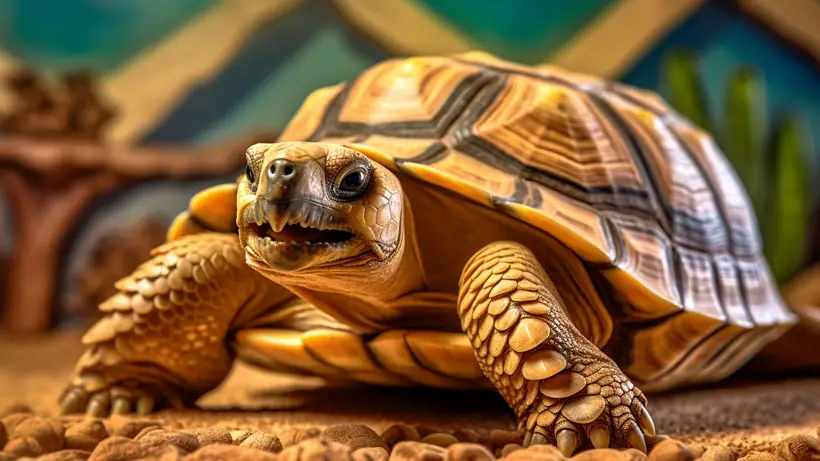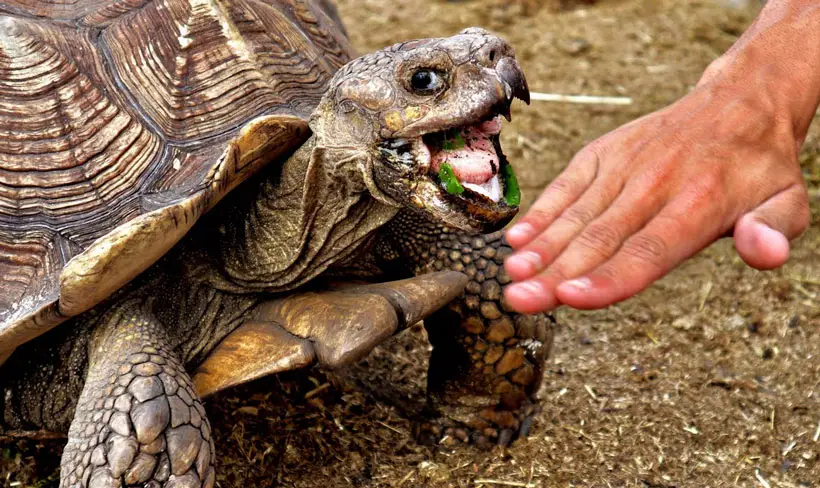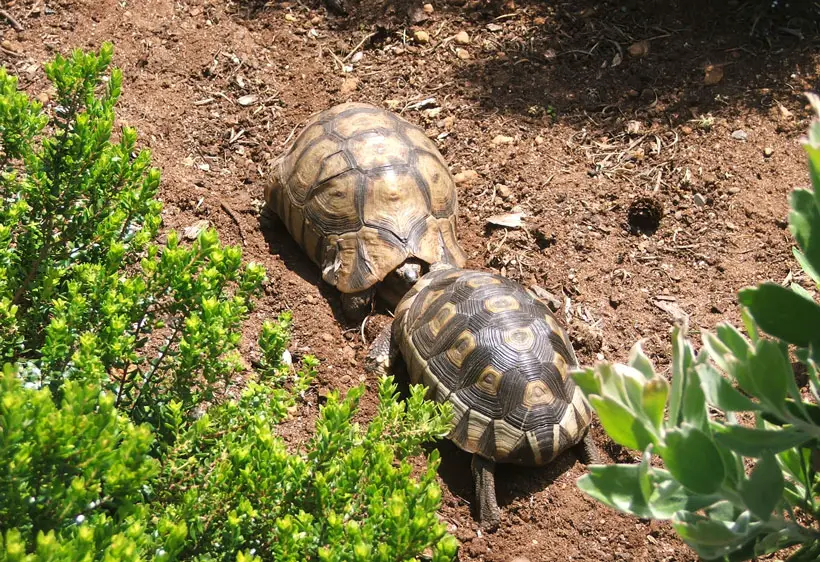Tortoise Bite 101: Do They Bite? Is It Dangerous?
Generally, tortoises don’t show much aggression like any other reptile. Yet, under any crucial circumstances, they can get aggressive and attack their potential risks.
Now, let’s know about tortoise bite 101. Do they bite? Is it dangerous? Yes, they can bite by mistakes, feeling threatened, for dominance, mating, etc. Generally, herbivore tortoises can only cause a little redness or cut in the skin; whereas carnivore ones can amputate your body parts.
Throughout this article, we will give you an overall idea about their bites and their reasons for this. You will learn the severity, and how to avoid and treat their bites. Hence, keep reading.
Do Tortoises Bite?
Contents
Yes, tortoises can bite even though they are not aggressive creatures by nature. In various cases like self-defense, stress, or mating they may bite each other. Besides, there are also numerous records of this reptile biting their caregivers and handlers.

Interestingly, they don’t have any teeth; still, they can bite using their beaks. Mainly, their beaks have a well-developed edgy, or pointy structure to cut through their food. Typically, their bite intensity will significantly depend on their food habits and sizes.
How Dangerous Are Their Bites?
Let’s see how dangerous their bite can be depending on various factors:
- Carnivore tortoises are more dangerous: Usually, carnivore tortoises have more pointy and sharper edges in their beaks than any herbivore tortoises. Thus, if they are carnivores, their bite will be more dangerous than the herbivore ones.

For example, yellow-foot tortoises, hinge-back tortoises, red-foot tortoises, elongated tortoises, etc., are omnivores. On the other hand, Galapagos tortoises, desert tortoises, Radiated tortoises, Seychelles giant tortoises, etc., are several examples of herbivorous ones.
- Large tortoises are more harmful: With their increasing size both the size and power of their jaw will also keep increasing.
Thus, giant tortoises like sulcata, Aldabra tortoises, and Galapagos tortoises have more dangerous bites than small species like Greek, Hermann’s, and Russian tortoises.
- Simple cut or redness: If your tortoise is tiny, it can only create slight redness in your finger by biting. This readiness can stay for several hours and then will go away.
- Risk of amputations: When you have a huge tortoise, its bites can create deep and open wounds. They can even amputate any body parts of yours by biting off.
- Spread of bacteria: These reptiles are bearers of salmonella bacteria. Thus, they can cause and spread salmonella disease among people through their bites.
Luckily, salmonella disease isn’t severe for humans. You can recover within weeks by taking only antibiotics.
- Allergic reaction: Some people can get allergic reactions after a tortoise bites them. If you feel any allergic reaction, consult a physician shortly.
You can check this Youtube video to understand tortoises’ biting ability more:
Why Do They Bite?
Depending on various factors like their species and surrounding environment, their biting habit will vary. Let’s know in detail about their reasons for biting:
New Place Or Lifestyle
When you bring a tortoise into your place, it initially doesn’t get used to you. Your smells are unfamiliar to them and they get conscious every time you approach them.
Also, they do not like changes in their routine. If you try to change their schedule, they may get irritated and react aggressively by biting you.
Self Defense
In the wild, the tortoise mostly bites due to self-defense purposes. When they feel threatened or can’t get any way to escape, they might snap at their predators or potential risks.

Mating
During the mating seasons, the tortoise may release pheromones to attract and know the sexual maturity of the opposite gender. But most of the tortoises won’t release any pheromones. In this case, the male will show their interest in mating by biting the female tortoise.
Territorial Fight
Generally, male tortoises are quite territorial and get into fights with each other. During their fight, they might bite each other severely. Generally, they possess the strength of snapping off a leg of a tortoise.
Also, female tortoises can bite each other to fight over their dominance. Usually, the taller ones are more dominant than the shorter females.

Thus, you will encounter female-female biting rarely if there are visible size differences. Yet, when the size of those female tortoises is similar, it will promote their aggressive and biting behavior.
Mistakes
Most tortoises bike mistakenly when you try to feed them. Also, if you handle their food with your hands, the smell of food will linger in your hands.
Hence, if you take your hands close to them, they will bite your hand thinking it’s their food.
Stress
Improper and rough handling can stress your pet reptiles. Also, if you keep disturbing them frequently, they may get anxious and will release their anger by biting you.
How To Be Cautious To Avoid Their Bites?

Now, after the tortoise bite 101 or basic discussion, here are several tips for you that can help you to avoid their bites:
- Many tortoise species don’t like to get petted and handled. Besides, you shouldn’t pet them too frequently.
- Make sure not to hurt them while handling them.
- Always use plastic shoes or gloves before entering your toe or fingers into their enclosures.
- Respect their space and avoid provoking or startling them.
- Try not to create stress in them so that they get triggered to bite you. Also, leave them alone when you feel that they are stressed.
- Approach tortoises slowly and calmly without making loud noises suddenly.
- Avoid touching their head or putting your fingers near their mouth.
- If you don’t want to breed your pet reptiles, make sure you keep the male and female ones separated.
What To Do When They Bite?

When you get bitten by your pet tortoise, the best thing you can do is not panic. Your panic can stress your pet more and they will strengthen their jaw on you more. Even kicking them may also result in a deepening of their bite instead of releasing them.
Hence, follow the following tips when a tortoise bites you:
- Try to stay calm and your pet will release the bite within a few seconds.
- Then, you must clean the wound or bite area thoroughly with mild soap and warm water.
- Put an antiseptic or disinfectant ointment to prevent infection in your surrounding places.
- If its biker causes an open cut or wound on your skin, cover the cut with a clean bandage.
- Observe the bite for any signs of infection like pus, redness, or swelling.
- When the bite induces severe pain, is deep, or shows infection signs, consult a doctor shortly.
FAQs
In this FAQs section, we will answer several familiar questions about the biting habits of tortoises.
No, turtles induce way more force in bites than any tortoises. In the case of a snapping turtle, it will induce 1,000 psi through its bite. But as most of the tortoises are herbivores, their bites will be just enough to create pain.
In general cases, those tortoise species that people keep as pets are not aggressive and less prone to bite you. But in the wild, tortoises of any species need to be more aggressive for survival.
Avoid hand-feeding them as it may let them think that your hand is also their food. Instead of this, there is no particular method to train your pet in this case.
Conclusion
A tortoise may bite you if you disturb them, handle them inappropriately, startle them, or try to hand-feed them. Also, they can bite each other during mating seasons or territorial fights. According to our long discussion about tortoise bite 101, tortoise bites are generally not a major concern.
Though their bite can spread salmonella or even cause amputation of body parts, you can avoid these easily. Make sure you are approaching and handling the pet with care and respect. With the proper handling of strategies, you can minimize the likelihood of bites and encourage a safe interaction.

